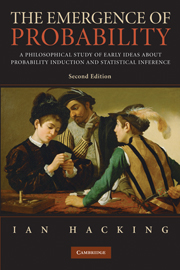 The Emergence of Probability
The Emergence of Probability Book contents
- Frontmatter
- Contents
- Introduction 2006
- 1 An absent family of ideas
- 2 Duality
- 3 Opinion
- 4 Evidence
- 5 Signs
- 6 The first calculations
- 7 The Roannez circle (1654)
- 8 The great decision (1658?)
- 9 The art of thinking (1662)
- 10 Probability and the law (1665)
- 11 Expectation (1657)
- 12 Political arithmetic (1662)
- 13 Annuities (1671)
- 14 Equipossibility (1678)
- 15 Inductive logic
- 16 The art of conjecturing (1692[?] published 1713)
- 17 The first limit theorem
- 18 Design
- 19 Induction (1737)
- Bibliography
- Index
1 - An absent family of ideas
Published online by Cambridge University Press: 05 April 2013
- Frontmatter
- Contents
- Introduction 2006
- 1 An absent family of ideas
- 2 Duality
- 3 Opinion
- 4 Evidence
- 5 Signs
- 6 The first calculations
- 7 The Roannez circle (1654)
- 8 The great decision (1658?)
- 9 The art of thinking (1662)
- 10 Probability and the law (1665)
- 11 Expectation (1657)
- 12 Political arithmetic (1662)
- 13 Annuities (1671)
- 14 Equipossibility (1678)
- 15 Inductive logic
- 16 The art of conjecturing (1692[?] published 1713)
- 17 The first limit theorem
- 18 Design
- 19 Induction (1737)
- Bibliography
- Index
Summary
In 1865 Isaac Todhunter published A History of the Mathematical Theory of Probability from the Time of Pascal to that of Laplace. It remains an authoritative survey of nearly all work between 1654 and 1812. Its title is exactly right. There was hardly any history to record before Pascal, while after Laplace probability was so well understood that a page-by-page account of published work on the subject became almost impossible. Just six of the 618 pages of text in Todhunter's book discuss Pascal's predecessors. Subsequent scholarship can do better but even now we can light on only a few earlier memoranda and unpublished notes. Yet in ‘the time of Pascal’ all manner of citizens recognized the emergent idea of probability. A philosophical history must not only record what happened around 1660, but must also speculate on how such a fundamental concept as probability could emerge so suddenly.
Probability has two aspects. It is connected with the degree of belief warranted by evidence, and it is connected with the tendency, displayed by some chance devices, to produce stable relative frequencies. Neither of these aspects was self-consciously and deliberately apprehended by any substantial body of thinkers before the time of Pascal. There have been several tentative explanations of this fact. I shall describe them briefly here, but we shall see that none of them is at all satisfactory.
- Type
- Chapter
- Information
- The Emergence of ProbabilityA Philosophical Study of Early Ideas about Probability, Induction and Statistical Inference, pp. 1 - 10Publisher: Cambridge University PressPrint publication year: 2006


